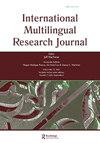A young linguistic and cultural mediator: a case of trilingual siblings’ interaction
IF 2.1
1区 文学
Q2 EDUCATION & EDUCATIONAL RESEARCH
引用次数: 1
Abstract
ABSTRACT Siblings play crucial roles in each other’s cognitive and language development because they observe, imitate, and receive guidance and support from each other during their interactions. In this research, we examined trilingual siblings (ages 6 and 9) from an immigrant family with a rarely explored cultural background (American-born children of Korean Chinese parents) and their multilingual interactions with a researcher. Employing cultural historical activity theory (CHAT) and Vygotsky’s notion of mediation (Vygotsky, 1978), we particularly focused on the roles that the older multilingual sibling took on during interactions and what mediations of meaning-making took place that created learning opportunities. Our analysis was based on the interaction data between the siblings. Findings revealed that the older sibling played a unique role as a linguistic and cultural mediator, assisting meaning-maintaining processes in multilingual interactions by providing interlingual and intralingual interpretation and transferring linguistic and cultural knowledge. Given the current educational landscape that prioritizes learning English, and the complexities of maintaining three languages for trilingual children, this study adds to the literature highlighting the unique roles multilingual children can play in expanding others’ languages, literacies, and cultures, as well as facilitating multilingual communicative events.一个年轻的语言和文化中介:以三语兄弟姐妹的互动为例
兄弟姐妹在彼此的认知和语言发展中起着至关重要的作用,因为他们在互动过程中会观察、模仿对方,并从对方那里获得指导和支持。在这项研究中,我们调查了来自一个移民家庭的三语兄弟姐妹(6岁和9岁),他们的文化背景很少被探索(在美国出生的韩国华裔父母的孩子),以及他们与一名研究人员的多语言互动。运用文化历史活动理论(CHAT)和维果茨基的中介概念(Vygotsky, 1978),我们特别关注多语言的年长兄弟姐妹在互动中所扮演的角色,以及创造学习机会的意义创造的中介。我们的分析是基于兄弟姐妹之间的互动数据。研究结果显示,哥哥姐姐作为语言和文化中介发挥了独特的作用,通过提供语际和语内解释以及传递语言和文化知识,帮助多语言互动中的意义维持过程。鉴于当前的教育格局优先考虑英语学习,以及为三语儿童保持三种语言的复杂性,本研究补充了文献,强调了多语儿童在扩展他人的语言,识字和文化以及促进多语交际活动方面可以发挥的独特作用。
本文章由计算机程序翻译,如有差异,请以英文原文为准。
求助全文
约1分钟内获得全文
求助全文
来源期刊
CiteScore
4.10
自引率
4.80%
发文量
19
期刊介绍:
The International Multilingual Research Journal (IMRJ) invites scholarly contributions with strong interdisciplinary perspectives to understand and promote bi/multilingualism, bi/multi-literacy, and linguistic democracy. The journal’s focus is on these topics as related to languages other than English as well as dialectal variations of English. It has three thematic emphases: the intersection of language and culture, the dialectics of the local and global, and comparative models within and across contexts. IMRJ is committed to promoting equity, access, and social justice in education, and to offering accessible research and policy analyses to better inform scholars, educators, students, and policy makers. IMRJ is particularly interested in scholarship grounded in interdisciplinary frameworks that offer insights from linguistics, applied linguistics, education, globalization and immigration studies, cultural psychology, linguistic and psychological anthropology, sociolinguistics, literacy studies, post-colonial studies, critical race theory, and critical theory and pedagogy. It seeks theoretical and empirical scholarship with implications for research, policy, and practice. Submissions of research articles based on quantitative, qualitative, and mixed methods are encouraged. The journal includes book reviews and two occasional sections: Perspectives and Research Notes. Perspectives allows for informed debate and exchanges on current issues and hot topics related to bi/multilingualism, bi/multi-literacy, and linguistic democracy from research, practice, and policy perspectives. Research Notes are shorter submissions that provide updates on major research projects and trends in the field.

 求助内容:
求助内容: 应助结果提醒方式:
应助结果提醒方式:


